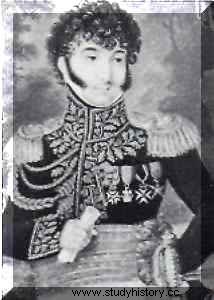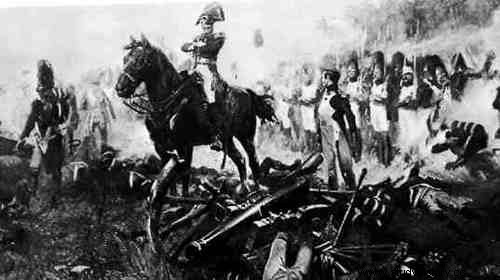April 30, 1773 (Ardres) - July 24, 1812 (Paris)
-

- Portrait of Dorsenne
A volunteer in 1791, Dorsenne distinguished himself by his ardor in the Northern Army, becoming a captain there before going to the Rhine, then to Italy. His courage worked wonders during the passage of the Tagliamento (March 16, 1797) and Bonaparte made him battalion commander before taking him with him to Egypt, where he was wounded several times. In 1805, the Emperor made him enter the guard as a major. Having again distinguished himself at Austerlitz, Dorsenne found himself colonel on December 18, 1805 and brigadier general on December 25. Famous in the army for the delicacy of his features, the care he attaches to his person and his dress, nicknamed "the handsome Dorsenne", he took command of the foot grenadiers of the guard at the end of 1806, distinguished himself at Eylau, was made Count Lepaige in 1808. After a brief stay in Spain, he returned to the Grande Armée, was in Regensburg, had two horses killed under him at Essling (May 22, 1809) and received a serious wound in the head as he covers the retreat. Promoted to division general shortly afterwards, he commanded the 2nd Guards Division at Wagram. He then left with her for Spain, became governor of Burgos then of Old Castile, commanded the army of northern Spain in place of Bessières, but had to return to France at the beginning of 1812 because of the consequences of the head injury received at Essling. He will die as a result of his trepanation. Dorsenne's name is inscribed on the Arc de Triomphe
-

- Dorsenne
Excerpt:the soldiers of the great army - Perrin, 1998 - Jc Damamme
Here appears "one of the most handsome men in the army", General Dorsenne, happy lover of the wife of the Chevalier d'Orsay, which caused people to say in the salons that she had the most handsome husband and the most beautiful lover from France. Dorsenne is an authentic dandy, very concerned about his appearance and especially his magnificent black curly hair. Thiébault, still upset but perhaps prey to this form of jealousy that men generally attribute to women, but which does not spare them the ridiculous judge. And yet he does not see him in Burgos, in the hands of his figaro who has been bent on making the general's curly hair even more beautiful for an hour. And in one hour, the expert has only treated half a head! Thiébault adds that Dorsenne's slender face hides a fool and that his agreeable silhouette serves as a screen for a proud, false and cruel being. In short, according to the memoirist, the man best suited to make more enemies to France in Spain than the entire Grande Armée could fight.
Nevertheless, stupid or not, ridiculous or not, this dandy from Dorsenne is one hell of a soldier. Two chroniclers, of very different hierarchical and social levels, come together in a mutual admiration for him. Indeed, if the drunkenness of a charge can make you forget the bloody wedding that will be celebrated during the meeting of the sabers, there is a form of courage that is rarer. So rare that it is attributed to Dorsenne alone:that of remaining motionless, with his back to the enemy to face his regiment sheared by cannonballs, without giving a look to death which rushes in, whistling. Some wanted to imitate Dorsenne. One admits:"I wanted to turn my back; I couldn't stay in this position, curiosity always forced me to look at the place from which the bullets came." Another who will see Dorsenne in Essling will not be able to retain a feeling of admiration for this golden wall defying the Austrian artillery."
